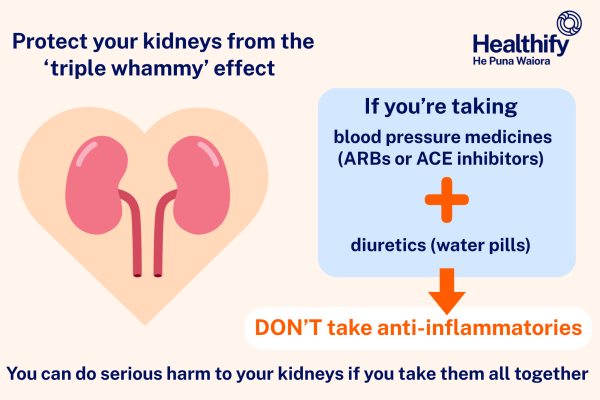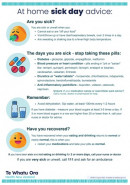If you're a frequent visitor to Healthify, why not share our site with a friend? Don't forget you can also browse Healthify without using your phone data.
Bumetanide
Sounds like 'bew-met-ah-nide'
Key points about bumetanide
- Bumetanide is a diuretic, which means it helps your body get rid of extra salt (sodium) and water.
- It's also called a 'water tablet' or 'water pill'.
- Bumetanide is also called Burinex®.
- Find out how to take it safely and possible side effects.

Bumetanide is a diuretic, which means it helps your body get rid of extra salt (sodium) and water. It works by increasing the amount of urine (pee) you make.
Bumetanide is used to reduce extra fluid in the body (called oedema) caused by conditions such as heart failure, liver disease, or kidney disease. This can reduce symptoms such as swelling in your ankles or feet, or shortness of breath.
In Aotearoa New Zealand, bumetanide is available as tablets (1 mg), or as an injection which is usually given in hospital.
- Always take your bumetanide exactly as your healthcare provider has told you. The pharmacy label on your medicine will tell you how much bumetanide to take, how often to take it, and any special instructions.
- The usual dose of bumetanide for adults is half to one tablet (0.5 mg to 1 mg) once a day. Some people may need higher doses.
- Your healthcare provider will advise you how long to take bumetanide for.
- Once a day dosing: Bumetanide is usually taken once a day. It's best taken in the morning so it works during the day.
- Twice a day dosing: Some people are prescribed a second dose, which should be taken 6 to 8 hours after the first dose. For example, if you take a dose at 8 am, your next dose can be taken at 2 pm.
- Timing: It’s best not to take a dose of bumetanide too late in the day because you'll need to pee within a few hours of taking it. You don’t want to disturb your sleep by needing to go to the toilet during the night. Read more about tips for taking diuretics.
- Food: You can take bumetanide with or without food.
- Missed dose: If you forget to take your dose, take it as soon as you remember. But if it is late in the afternoon, skip the missed dose and continue as usual the next day. Don't take double the dose.
Taking bumetanide with pain medicines
Be careful when taking some pain relief medicines. Taking NSAIDs, such as ibuprofen and diclofenac, together with blood pressure medicines, can be harmful to your kidneys. This is called the ‘triple whammy’. NSAIDs can also be found in some cold and flu medicines.
If you're taking bumetanide with other blood pressure medicines, such as ACE inhibitors or ARBs, tell your healthcare provider or pharmacist before starting NSAIDs. Talk to them about safe pain-relief options for you.

Image credit: Healthify He Puna Waiora
Read more about:
Some other things to know when you're taking bumetanide
- Have a sick day plan: If you have diarrhoea (runny poo) or are vomiting (being sick) from a stomach bug, or you're dehydrated from another illness, it’s important to let your healthcare provider know. They may advise you to stop taking bumetanide for a few days and start again when your eating and drinking returns to normal.
- Alcohol: Bumetanide doesn't directly interact with alcohol. This means that most people could have the occasional drink while taking it without any serious problems. However, if bumetanide makes you feel dizzy or sick (nausea) don't drink alcohol as it will make you feel worse.
- Sunlight: Protect yourself from too much sunlight while being treated with bumetanide. Always cover up and apply a thick layer of broad spectrum sunscreen (at least SPF 30) when outside. Don't use sunbeds.
- Monitoring: You may need blood tests while taking bumetanide to check the amount of potassium and sodium in your blood, and to see how well your kidneys are working.
- Interactions: Bumetanide may interact with other medicines, herbal supplements and rongoā Māori, so check with your healthcare provider or pharmacist before starting bumetanide and before starting any new products.
-
Pregnancy or breastfeeding: Talk to your healthcare provider if you're pregnant, planning a pregnancy or want to breastfeed.
Like all medicines bumetanide can cause side effects, although not everyone gets them. If you're concerned about any symptoms you think might be related to your medicine, talk to your healthcare provider. The information below offers some guidance but doesn’t include all possible side effects.
Common side effects
Tell your healthcare provider if these side effects bother you.
- Needing to pee more often: It's a good idea to know where the nearest toilets are when you’re away from home.
- Nausea (feeling sick) or having a sore stomach: Take your tablets with or just after food.
- Feeling light-headed or dizzy: Don’t drink alcohol. Be careful when driving or using tools until you know how this medicine affects you.
- Feeling faint when you stand up: Be careful when getting up from either lying down or sitting to avoid falls. These effects put you at risk of falls and injuries, especially if you're an older adult.
Tell your healthcare provider immediately or phone Healthline free on 0800 611 116 if these occur
- Signs and symptoms of gout such as pain, redness and swelling in a joint (eg, your big toe, wrist, elbow or knee). Bumetanide may raise uric acid levels in your blood and cause an acute attack of gout for some people.
- Signs of dehydration (losing too much salt and water) such as muscle cramps, weakness, dry mouth, feeling thirsty all the time or passing less urine than usual.
- Trouble with hearing, such as a ringing or buzzing sound in your ears, reduced or loss of hearing.
Read more about medicines and side effects and reporting a reaction you think might be a side effect.
The following links have more information on bumetanide.
Burinex(external link) Medsafe Consumer Medicine Information, NZ
Bumetanide(external link) New Zealand Formulary Patient Information te reo Māori(external link)
Brochures
At home sick day advice(external link) Health New Zealand | Te Whatu Ora, 2023
Medicines and side effects [PDF, 91 KB] Healthify He Puna Waiora, NZ, 2024
5 questions to ask about your medications(external link) Health Quality and Safety Commission, NZ, 2019 English(external link), te reo Māori(external link)
References
- Bumetanide(external link) New Zealand Formulary
- Loop diuretics(external link) New Zealand Formulary
- Avoiding the triple whammy in primary care – ACE inhibitor/ARB + diuretic + NSAID(external link) BPAC, NZ, 2018
- Addressing heart failure in primary care: Part 2 – initiating and optimising treatment for heart failure(external link) BPAC, NZ, 2025
Brochures

At home sick day advice
Health New Zealand | Te Whatu Ora, 2023

Medicines and side effects
Healthify He Puna Waiora, NZ, 2024

Health Quality and Safety Commission, NZ, 2019 English, te reo Māori
Credits: Healthify editorial team. Healthify is brought to you by Health Navigator Charitable Trust.
Reviewed by: Stephanie Yee, Pharmacist, Auckland.
Last reviewed:





